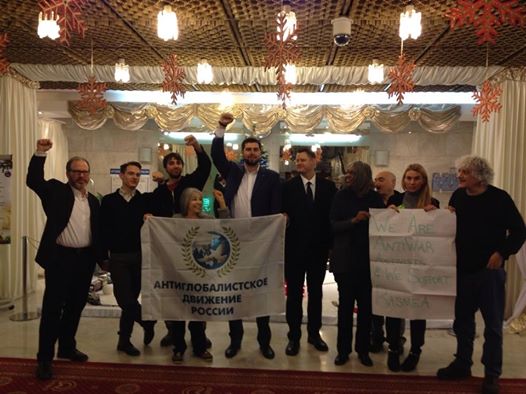As The Class Struggle Heats Up And We Take Arrests-Some Important Information From The American Civil Liberties Union
 Click below to link to an American Civil Liberties Union (ACLU)-Massachusetts website for additional information and links to other chapters.
Click below to link to an American Civil Liberties Union (ACLU)-Massachusetts website for additional information and links to other chapters.
http://aclum.org/
Markin comment:
I have crossed swords with the ACLU over their defense of "free speech" for fascists and other issues but this information is very useful as we take more arrests in our current struggles. And as the class struggle heats up and more occasions for arrest occur. We are not constrained by legalism, the ACLU's or anybody else's, in our actions, obviously, but we had better, collectively, be prepared on all fronts otherwise we will be picked off one by one.
*********
WHAT TO DO IF YOU'RE STOPPED BY POLICE, IMMIGRATION AGENTS OR THE FBI
We rely on the police to keep us safe and treat us all fairly, regardless of race, ethnicity, national origin or religion. This card provides tips for interacting with police and understanding your rights. <br />
Note: Some state laws may vary. Separate rules apply at checkpoints and when entering the U.S. (including at airports).
YOUR RIGHTS
- You have the right to remain silent. If you wish to exercise that right, say so out loud.
- You have the right to refuse to consent to a search of yourself, your car or your home.
- If you are not under arrest, you have the right to calmly leave.
- You have the right to a lawyer if you are arrested. Ask for one immediately.
- Regardless of your immigration or citizenship status, you have constitutional rights.
YOUR RESPONSIBILITIES
- Do stay calm and be polite.
- Do not interfere with or obstruct the police.
- Do not lie or give false documents.
- Do prepare yourself and your family in case you are arrested.
- Do remember the details of the encounter.
Do file a written complaint or call your local ACLU if you feel your rights have been violated.
IF YOU ARE STOPPED FOR QUESTIONING
Stay calm. Don't run. Don't argue, resist or obstruct the police, even if you are innocent or police are violating your rights. Keep your hands where police can see them.
Ask if you are free to leave. If the officer says yes, calmly and silently walk away. If you are under arrest, you have a right to know why. <br />
You have the right to remain silent and cannot be punished for refusing to answer questions. If you wish to remain silent, tell the officer out loud. <br >
In some states, you must give your name if asked to identify yourself. <br />
You do not have to consent to a search of yourself or your belongings, but police may "pat down" your clothing if they suspect a weapon. You should not physically resist, but you have the right to refuse consent for any further search. If you do consent, it can affect you later in court.
IF YOU ARE STOPPED IN YOUR CAR
Stop the car in a safe place as quickly as possible. Turn off the car, turn on the internal light, open the window part way and place your hands on the wheel.
Upon request, show police your driver's license, registration and proof of insurance.
If an officer or immigration agent asks to look inside your car, you can refuse to consent to the search. But if police believe your car contains evidence of a crime, your car can be searched without your consent. <br />
Both drivers and passengers have the right to remain silent. If you are a passenger, you can ask if you are free to leave. If the officer says yes, sit silently or calmly leave. Even if the officer says no, you have the right to remain silent. <br />
IF YOU ARE QUESTIONED ABOUT YOUR IMMIGRATION STATUS
You have the right to remain silent and do not have to discuss your immigration or citizenship status with police, immigration agents or any other officials. You do not have to answer questions about where you were born, whether you are a U.S. citizen, or how you entered the country. <br />
(Separate rules apply at international borders and airports, and for individuals on certain nonimmigrant visas, including tourists and business travelers.) <br />
If you are not a U.S. citizen and an immigration agent requests your immigration papers, you must show them if you have them with you. If you are over 18, carry your immigration documents with you at all times. If you do not have immigration papers, say you want to remain silent. <br />
Do not lie about your citizenship status or provide fake documents. <br />
IF THE POLICE OR IMMIGRATION AGENTS COME TO YOUR HOME
If the police or immigration agents come to your home, you do not have to let them in unless they have certain kinds of warrants. <br />
Ask the officer to slip the warrant under the door or hold it up to the window so you can inspect it. A search warrant allows police to enter the address listed on the warrant, but officers can only search the areas and for the items listed. An arrest warrant allows police to enter the home of the person listed on the warrant if they believe the person is inside. A warrant of removal/deportation (ICE warrant) does not allow officers to enter a home without consent. <br />
Even if officers have a warrant, you have the right to remain silent. If you choose to speak to the officers, step outside and close the door. <br />
IF YOU ARE CONTACTED BY THE FBI
If an FBI agent comes to your home or workplace, you do not have to answer any questions. Tell the agent you want to speak to a lawyer first. <br If you are asked to meet with FBI agents for an interview, you have the right to say you do not want to be interviewed. If you agree to an interview, have a lawyer present. You do not have to answer any questions you feel uncomfortable answering, and can say that you will only answer questions on a specific topic.
IF YOU ARE ARRESTED
Do not resist arrest, even if you believe the arrest is unfair. Say you wish to remain silent and ask for a lawyer immediately. Don't give any explanations or excuses. If you can't pay for a lawyer, you have the right to a free one. Don't say anything, sign anything or make any decisions without a lawyer.
You have the right to make a local phone call. The police cannot listen if you call a lawyer.
Prepare yourself and your family in case you are arrested. Memorize the phone numbers of your family and your lawyer. Make emergency plans if you have children or take medication.< br />
Special considerations for non-citizens:
- Ask your lawyer about the effect of a criminal conviction or plea on your immigration status.< br />
- Don't discuss your immigration status with anyone but your lawyer. <br />
- While you are in jail, an immigration agent may visit you. Do not answer questions or sign anything before talking to a lawyer. <br />
- Read all papers fully. If you do not understand or cannot read the papers, tell the officer you need an interpreter. <br />
IF YOU ARE TAKEN INTO IMMIGRATION (OR "ICE") CUSTODY
You have the right to a lawyer, but the government does not have to provide one for you. If you do not have a lawyer, ask for a list of free or low-cost legal services. <br />
You have the right to contact your consulate or have an officer inform the consulate of your arrest.
Tell the ICE agent you wish to remain silent. Do not discuss your immigration status with anyone but your lawyer. <br />
Do not sign anything, such as a voluntary departure or stipulated removal, without talking to a lawyer. If you sign, you may be giving up your opportunity to try to stay in the U.S
Remember your immigration number ("A" number) and give it to your family. It will help family members locate you. <br />
Keep a copy of your immigration documents with someone you trust.
IF YOU FEEL YOUR RIGHTS HAVE BEEN VIOLATED
Remember: police misconduct cannot be challenged on the street. Don't physically resist officers or threaten to file a complaint.
Write down everything you remember, including officers' badge and patrol car numbers, which agency the officers were from, and any other details. Get contact information for witnesses. If you are injured, take photographs of your injuries (but seek medical attention first).
File a written complaint with the agency's internal affairs division or civilian complaint board. In most cases, you can file a complaint anonymously if you wish.
Call your local ACLU or visit www.aclu.org/profiling.
This information is not intended as legal advice.
This brochure is available in English and Spanish / Esta tarjeta tambián se puede obtener en inglés y español.
Produced by the American Civil Liberties Union 6/2010
****

 Presidents Barack Obama and Raul Castro at Nelson Mandela's memorial
service in 2013
Presidents Barack Obama and Raul Castro at Nelson Mandela's memorial
service in 2013




